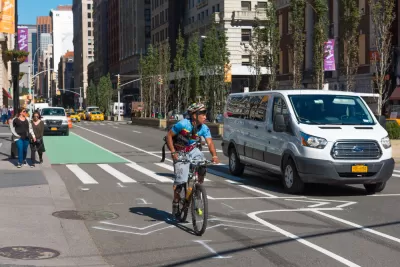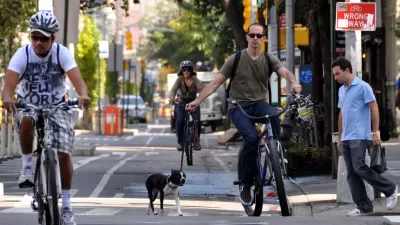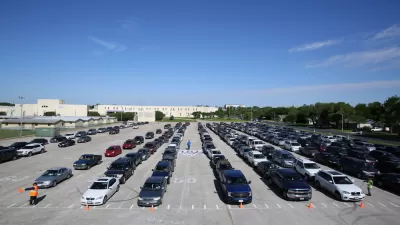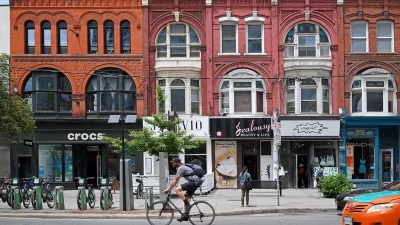Could the pandemic be a tipping point for a century of car-centric planning in New York City's to give way to a more bike-friendly city?

New York Times architecture critic Michael Kimmelman surveys the changing politics of bike planning in New York City, as evidenced by a slew of innovations implemented as public health and economic stimulus actions during the pandemic. Kimmelman starts off by describing recent planning developments, all documented previously Planetizen, as a glimmer of hope for a change to planning in the city.
- 'Open Restaurants on Open Streets' Program Announced in NYC (July 6, 2020)
- Electric Bikes and Scooters Legalized in New York City (June 29, 2020)
- First New Bridge to Manhattan in Decades Proposed Just for Pedestrians and People on Bikes (June 25, 2020)
- Bike-Centered Brooklyn Bridge Redo Under Consideration (June 22, 2020)
- Five Borough Bikeway Plan Released (June 18, 2020)
- Court Decision Clears the Way for East River Greenway Bike Bridge (May 12, 2020)
- Signal Priority in N.Y.C. to Make Streets Safer for Cyclists (November 6, 2019)
According to Kimmelman, the city is faced with two particularly ambitious potential paths forward to ensure a more bike-friendly future: the Regional Plan Association's Five Borough Bikeway Plan and the Queens Ribbon Bridge. The time is now to act on plans like these, argues Kimmelman:
Getting through this whole crisis depends on city leaders’ capacity to think ahead, not hunker down. Robert Moses, New York’s storied planning czar, plotted during the depths of the Depression so he could be ready when the money materialized. Whatever else one might say about Moses, he knew how to get stuff done.
By contrast, New York today has become good at shooting down new ideas, celebrating defeat over compromise, pointing out why any big, costly initiative is not worth pursuing because something else also needs doing, as if a great city shouldn’t find ways to do more than one thing at a time.
The city has changed before, according to one of the big statements included in this article. The current economic and public health crisis could provide another tipping point.
FULL STORY: New York as a Biking City? It Could Happen. And It Should.

Maui's Vacation Rental Debate Turns Ugly
Verbal attacks, misinformation campaigns and fistfights plague a high-stakes debate to convert thousands of vacation rentals into long-term housing.

Planetizen Federal Action Tracker
A weekly monitor of how Trump’s orders and actions are impacting planners and planning in America.

In Urban Planning, AI Prompting Could be the New Design Thinking
Creativity has long been key to great urban design. What if we see AI as our new creative partner?

Portland Raises Parking Fees to Pay for Street Maintenance
The city is struggling to bridge a massive budget gap at the Bureau of Transportation, which largely depleted its reserves during the Civd-19 pandemic.

Spokane Mayor Introduces Housing Reforms Package
Mayor Lisa Brown’s proposals include deferring or waiving some development fees to encourage more affordable housing development.

Houston Mayor Kills Another Bike Lane
The mayor rejected a proposed bike lane in the Montrose district in keeping with his pledge to maintain car lanes.
Urban Design for Planners 1: Software Tools
This six-course series explores essential urban design concepts using open source software and equips planners with the tools they need to participate fully in the urban design process.
Planning for Universal Design
Learn the tools for implementing Universal Design in planning regulations.
Gallatin County Department of Planning & Community Development
Heyer Gruel & Associates PA
JM Goldson LLC
City of Camden Redevelopment Agency
City of Astoria
Transportation Research & Education Center (TREC) at Portland State University
Jefferson Parish Government
Camden Redevelopment Agency
City of Claremont





























